

What If We're Beyond Mere Policy Tweaks? (February 6, 2012) The nation's ills cannot be fixed by thousands of pages of regulation or more policy tweaks.
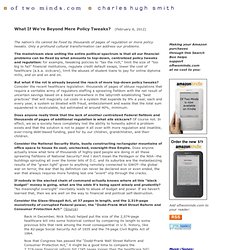
Only a profound cultural transformation can address our problems. The mainstream view uniting the entire political spectrum is that all our financial problems can be fixed by what amounts to top-down, centralized policy tweaks and regulation: for example, tweaking policies to "tax the rich," limit the size of "too big to fail" financial institutions, regulate credit default swaps, lower the cost of healthcare (a.k.a. sickcare), limit the abuses of student loans to pay for online diploma mills, and on and on and on.
Tail Risk and Embalming Fluid, in 2012. I feel motivated today to write about global markets, and especially the lingering fear that’s sure to carry over from 2011 to 2012.
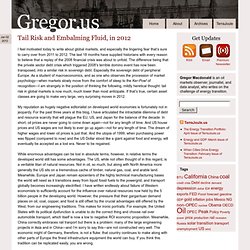
The last 18 months have supplied historians with every reason to believe that a replay of the 2008 financial crisis was about to unfold. The difference being that the private sector debt crisis which triggered 2008′s terrible domino event has now been transposed, into a similar risk in sovereign debt. Especially the sovereign debt of peripheral Europe. Sara Horowitz - Authors. The Freelance Surge Is the Industrial Revolution of Our Time - Sara Horowitz - Business. Book review: Improvisational economies and a globalized building. Posted by Ethan on Dec 7th, 2011 in Developing world, ideas | 2 comments Robert Neuwirth is bringing new insights to familiar (for him, unfamiliar for most of us) territory in his book, “Stealth of Nations“.
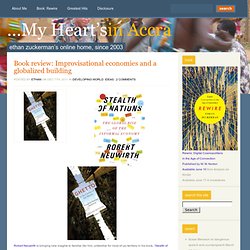
His previous work, “Shadow Cities” was a plea to take squatter cities and informal settlements seriously, rather than dismissing them as slums. (My review of Shadow Cities is here.) New Currency Frontiers. Transforming corporate forms through currencies. Transforming corporate forms through currencies Michel Bauwens 10th August 2011.
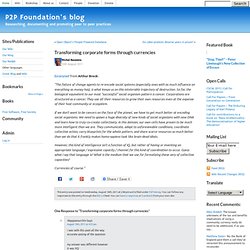
Innovation needs to be freed. John Perry Barlow used the eG8 to demolish IP monopolies claims.
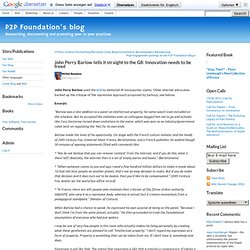
The Link Between Peak Oil and Peak Debt – Part 1. The economy is closely linked with the physical resources that underly it.
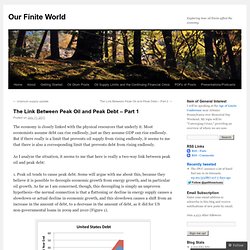
Most economists assume debt can rise endlessly, just as they assume GDP can rise endlessly. Commons as a Corporation. This point of view, ‘the commons must be a corporation’, may come as a shocker and is by no means an easy text, I had to reread it a few times, but, worth pondering.
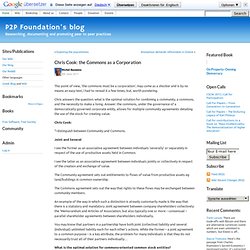
Gregor.us. If you can quantify the self, can you also program it? The Quantified Self health movement, once thought limited to elite athletes or patients suffering from chronic disease, has been steadily expanding beyond body hackers and body builders.

Recent research on how the Internet is shaping healthcare from the Pew Internet and Life Project contained an eye-opening fact: fully one quarter of online adults were tracking their own health statistics. There’s clearly something important going on here. To learn more, I turned to Fred Trotter (@fredtrotter). Trotter and David Uhlman are writing a book on health information technology for O’Reilly, titled “Getting to Meaningful Use and Beyond.” Trotter has advanced the Quantified Self discussion one step further by asking, if you can quantify the self, can you also program it? This Time Really Is Different. Arts2090 – Publics and Publishing. Changing Models of Ownership. Revival of the cooperative economy in the U.S. and in the UK.
Excerpted from Gar Alperovitz in Yes magazine: (original has many links) At the cutting edge of experimentation are the growing number of egalitarian, and often green, worker-owned cooperatives.
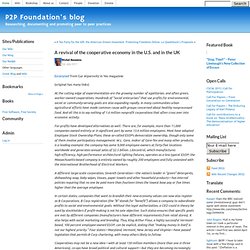
Hundreds of “social enterprises” that use profits for environmental, social or community-serving goals are also expanding rapidly. In many communities urban agricultural efforts have made common cause with groups concerned about healthy nonprocessed food. And all this is to say nothing of 1.6 million nonprofit corporations that often cross over into economic activity. Kevin Kelly on how to sell free. The question of whether access or ownership is more important was directly addressed — and answered — by Kevin Kelly, senior maverick at Wired magazine, during his keynote speech at TOC 2011.
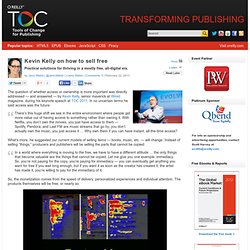
In no uncertain terms he said access was the future: There’s this huge shift we see in the entire environment where people get more value out of having access to something rather than owning it. With Netflix, you don’t own the movies, you just have access to them — Spotify, Pandora, and Last FM are music streams that go by; you don’t actually own the music, you just access it … Why own them if you can have instant, all-the-time access? What’s more, he suggested our current models of selling items — books, music, etc. — will change. The Onset of Catabolic Collapse. I've commented more than once on the gap in perception between history as it appears in textbooks and history as it's lived by people on the spot at the time. That's a gap worth watching, because the foreshortening of history that comes with living in the middle of it quite often gets in the way of figuring out a useful response to a time of crisis -- for example, the one we're in right now. This is all the more challenging because the foreshortening of history cuts both ways; it makes small but sudden events look more important than they are, and it also helps hide slow but massive shifts that will play a much greater role in shaping the future.
The same gap in perception afflicts most current efforts to make sense of the future looming up ahead of us. Maintaining critical infrastructures on the other side of the oil peak. Locke and his Failed Metaphysics of Private Property. Economic benefits of shorter working hours in a new ‘non-economic’ conception of time. Protecting bankers’ and creditors’ interests above all else is foolish economic policy. It enriches one group of people at the expense of nearly everyone else. Excerpted from Juliet Schor, commons-oriented economist, author of the book Plenitude: (Juliet’s proposals are rooted in her different conception of time, which we feature just below) “Protecting bankers’ and creditors’ interests above all else is foolish economic policy.
Case study of a community economy: The Alliance to Develop Power in western Massachusetts: Via (originally from The Nation): The Ten States Running Out Of Children. Peak Oil & Future of Urbanism. Building a 21st Century Economy. Positive role of complementary currencies (thesis of the week, part 2) Ivan Tsikota has produced an interesting Master’s Thesis confirming that complementary currency systems (broadly conceived) have positive economic effects, and under which conditions these effects can be stimulated.
Also of interest is that Ivan proposes a new taxonomy of economic systems. * Master’s Thesis: Complements to Economic Systems: Increasing Local Economic Sustainability. Ivan Tsikota. 2011-05-14. EC9901 Master’s Thesis, 30 hp . Department of Economics , Stockholm University. Life After Shopping.